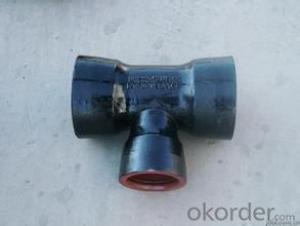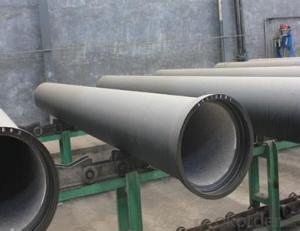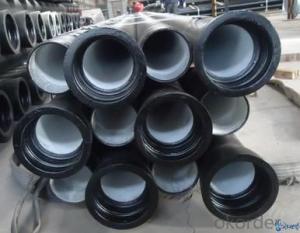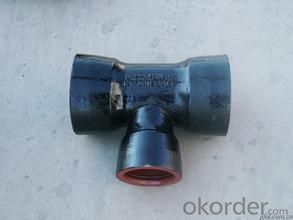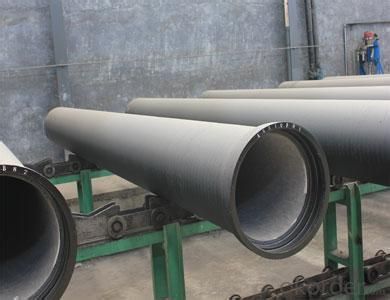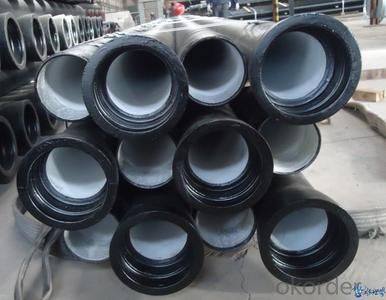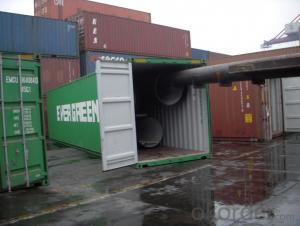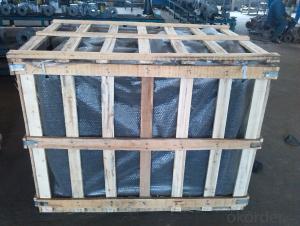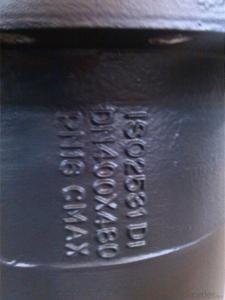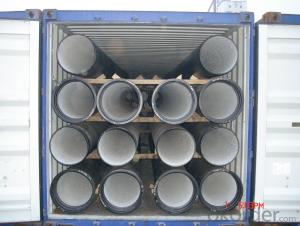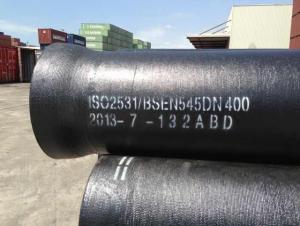DUCTILE IRON PIPE C Class DN700
- Loading Port:
- China Main Port
- Payment Terms:
- TT OR LC
- Min Order Qty:
- -
- Supply Capability:
- -
OKorder Service Pledge
OKorder Financial Service
You Might Also Like
Ductile Iron Cast Pipe is without any defects compare with tradition casting tech, which has many advantages particularly as follow:
(1) High density. In the "vertical upward casting" process, the melt iron of centre liquid column in center crystallizer is continuously feeding for volume shrinkage caused by condensation tube at outer circumference , which lead to be free of shrinkage porosity.
(2) High purity. When melt iron pouring, the mixed impurities such as gas, dross, sand grain which are lighter than melt iron could be eliminated at furnace mouth, its impossible to enter into the crystallizer through the channel, so the melt iron into the crystallizer is very pure.
(3) Strength with toughness. The cooling speed provided by continuous crystallizer is 30 times than sand casting and 5 times than centrifugal casting, and doesn't produce white iron, the eutectic cell volume of continuous cast iron is one eighth to one tenth compare with traditional cast iron. The density of graphite nodule in ductile iron can reach 300-700 pcs/mm2. Therefore, all reason above improve the strength and toughness of continuous cast iron.
(4) Free machining. The high speed cooling make the hardening phase (such as boride, steadite) not appear like reticular, massive or thick, but diffuse like fish bone and pane in shape, moreover, there are tiny graphite flakes inlaid hardening phase. It's free machining in BrinellHardness the range of 250-300HB. However, the Brinell Hardness of 250 is top limit to common metal materials.
(5) Uniform composition of tube wall. The convection mixing of liquid column caused by marching type drawing in crystallizer make the composition of tube wall well-distributed, and concentration gradient very little.
(6) High productivity. To the wall thickness of tube under 10mm, the speed of continuous casting is 1 meter/min, to the wall thickness of tube under 20mm, the speed of continuous casting is 0.5 meter/min, which is high efficiency that centrifugal or other casting tech couldn't reach.
- Q: What is the cost of ductile iron pipes compared to other materials?
- The cost of ductile iron pipes compared to other materials can vary depending on several factors such as the size, length, and application of the pipes. In general, ductile iron pipes tend to be more expensive than other materials such as PVC or HDPE (high-density polyethylene) pipes. This is primarily due to the superior strength, durability, and longevity offered by ductile iron pipes. While the initial cost of ductile iron pipes may be higher, they often provide a more cost-effective solution in the long run due to their extended lifespan. Ductile iron pipes have a life expectancy of over 100 years, making them a highly reliable and low-maintenance choice for water, sewage, and gas distribution systems. This longevity reduces the need for frequent replacements, repairs, and associated costs. Furthermore, ductile iron pipes are known for their exceptional resistance to external loads, pressure, and corrosion. This makes them well-suited for a wide range of applications, including high-pressure water and gas transmission, industrial pipelines, and sewer systems. The inherent strength of ductile iron pipes allows for thinner walls, resulting in reduced material and installation costs when compared to other materials. It is important to note that the cost of ductile iron pipes can also be influenced by market conditions, transportation costs, and availability of raw materials. Therefore, it is always advisable to consult with suppliers and conduct a cost-benefit analysis before making a decision.
- Q: Can ductile iron pipes be used for railway bridges?
- Indeed, railway bridges can utilize ductile iron pipes. Ductile iron, a resilient and sturdy form of cast iron, possesses remarkable tensile strength and flexibility. These characteristics render it suitable for a wide array of uses, railway bridges included. Ductile iron pipes serve as ideal building materials for various railway bridge elements, such as supports, beams, and columns, providing not only structural stability but also the ability to endure substantial loads and vibrations associated with railway traffic. Moreover, ductile iron pipes exhibit resistance to corrosion, a vital attribute for railway bridges that face exposure to outdoor conditions. Consequently, ductile iron pipes represent a viable and effective choice for constructing railway bridges.
- Q: Will the cast iron pipes rust?
- Qualified ductile iron pipes can be used for more than a hundred years. The main place where rust is easily exposed is where the outer wall meets the soil because of its high humidity and high oxygen content. Qualified anticorrosion can effectively resist rust, its process principle can not give you the details. Although the wall has a long flow of water, but oxygen scarce, compared with the outer wall is not easy to corrosion, but there is cement lining is necessary.
- Q: What is the relationship between the direction of the spigot and the direction of the flow in the ductile iron pipe?
- Use more than 18 casting molten iron, by adding the spheroidizing agent, through the centrifugal ductile iron machine high-speed centrifugal casting pipe
- Q: How are ductile iron pipes made?
- The manufacturing of ductile iron pipes involves a specific process called centrifugal casting. In this process, molten iron is poured into a rotating mold, typically made of steel. The rotation of the mold creates centrifugal force, which evenly distributes the molten iron, resulting in high-quality pipes. To start the manufacturing process, a mixture of scrap iron, steel, and recycled material is melted at extremely high temperatures in a furnace. Once the molten iron reaches the desired temperature and consistency, it is ready to be cast into pipes. To prevent the molten iron from cooling too quickly, the rotating mold is preheated. This preheating also contributes to achieving a smooth surface finish on the pipes. The molten iron is then poured into the rotating mold through a central sprue. As the mold spins, centrifugal force forces the molten iron against the inner walls of the mold. This rapid solidification results in dense, strong, and corrosion-resistant pipes. The centrifugal force also helps remove impurities or slag from the inner surface of the pipe, further enhancing its quality. Once the casting process is complete, the mold is allowed to cool, and the pipe is removed. The pipes undergo various tests to ensure they meet the required quality standards. These tests include checking dimensions, mechanical properties, and surface finish. After passing the quality tests, ductile iron pipes are typically coated with a protective lining to prevent corrosion and extend their lifespan. The type of lining used, such as cement mortar, epoxy, or polyethylene, depends on the intended application of the pipes. In conclusion, the centrifugal casting process is utilized to manufacture ductile iron pipes. This process ensures the production of high-quality pipes that are strong, corrosion-resistant, and have a smooth surface finish.
- Q: Are ductile iron pipes suitable for deep burial installations?
- Indeed, deep burial installations can accommodate ductile iron pipes. These pipes possess remarkable strength and endurance, rendering them highly suitable for subterranean purposes. They possess the ability to withstand the immense pressure exerted by soil as well as any external forces that may arise. Moreover, ductile iron pipes exhibit exceptional resistance to corrosion, a vital characteristic for ensuring long-lasting performance in buried settings. Furthermore, their flexibility enables them to endure ground movements and settle without fracturing. All in all, ductile iron pipes represent a dependable and economically efficient option for deep burial installations.
- Q: How are ductile iron pipes tested for quality assurance?
- Ductile iron pipes are tested for quality assurance through various methods such as hydrostatic testing, visual inspection, and mechanical testing. Hydrostatic testing involves subjecting the pipes to high-pressure water to check for any leaks or weaknesses. Visual inspection is carried out to identify any surface defects or irregularities that may affect the quality of the pipe. Mechanical testing includes conducting tensile strength tests, elongation tests, and hardness tests to ensure that the pipes meet the required standards and can withstand the intended application. These testing procedures help ensure the quality and reliability of ductile iron pipes.
- Q: Are ductile iron pipes suitable for airport runway drainage?
- Yes, ductile iron pipes are suitable for airport runway drainage. Ductile iron pipes are known for their durability, strength, and resistance to corrosion, making them an ideal choice for handling heavy loads and withstanding harsh environmental conditions typically found on airport runways.
- Q: Can ductile iron pipes be used in oil or gas transmission pipelines?
- Yes, ductile iron pipes can be used in oil or gas transmission pipelines. Ductile iron is a type of cast iron that has enhanced properties, such as higher tensile strength and ductility, making it suitable for a wide range of applications, including pipeline systems for oil and gas transmission. Ductile iron pipes have excellent corrosion resistance, which is crucial for pipelines that transport oil or gas over long distances. This material is highly resistant to external factors like soil chemicals, moisture, and corrosive gases commonly found in the oil and gas industry. Additionally, ductile iron pipes can withstand high pressures and temperatures, making them suitable for the demands of oil and gas transmission. Furthermore, ductile iron pipes have good impact resistance, allowing them to absorb and withstand external forces like ground movement or heavy loads. This durability ensures the integrity and longevity of the pipeline system, minimizing the risk of leaks or failures. Overall, ductile iron pipes offer a reliable and cost-effective solution for oil and gas transmission pipelines. Their robustness, corrosion resistance, and ability to withstand high pressures and temperatures make them a viable choice for this critical infrastructure.
- Q: Are ductile iron pipes resistant to freeze-thaw cycles?
- Ductile iron pipes exhibit resistance against freeze-thaw cycles. Ductile iron, a variant of cast iron, is fortified with magnesium, which enhances its strength, durability, and ability to resist cracking. These improved material properties enable ductile iron pipes to withstand the expansion and contraction that occur during freeze-thaw cycles. Unlike PVC or concrete, which may fracture or shatter due to the pressure exerted by freezing water, ductile iron pipes remain intact without suffering substantial damage. Moreover, the smooth interior surface of ductile iron pipes prevents the accumulation of ice or frost, thereby augmenting their resistance to freeze-thaw cycles. In conclusion, ductile iron pipes are an optimal choice for water distribution systems in cold climates, as they provide exceptional resistance against the adverse effects of freezing and thawing.
Send your message to us
DUCTILE IRON PIPE C Class DN700
- Loading Port:
- China Main Port
- Payment Terms:
- TT OR LC
- Min Order Qty:
- -
- Supply Capability:
- -
OKorder Service Pledge
OKorder Financial Service
Similar products
Hot products
Hot Searches
Related keywords
